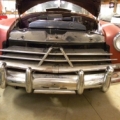Hinge screws?

keithfullmeryahoocom
Expert Adviser
in HUDSON
I am in the process of removing some of the doors on my '50 Commodore to straighten and remove paint and weather stripping. The old phillips bolts/screws that hold the hinges to the door jam are frozen and require drilling out to remove them. Does anyone know a sourse to replace them? Or maybe just the information of what they are so I can acquire more?
0
Comments
-
Before you drill them all out, try rapping them with a ball peen hammer and then using Kroil( or whatever suits you) and let them soak. Then try removing them. If you need some screws let me know I have them.0
-
Thanks, Lance. I tried all this and more--everything I know including heat and an impact remover. They appear to have been off before and are somewhat buggered up. I'll keep you in mind and let you know how many I need when I complete the destruction...k0
-
Several years back a former poster, recommended a WIVCO Shake-N- Break A06F3A tool that fits into a air powered chisel. This tool definately works and breaks the screw loose from the backing plate. The part number is TH28.000, I purchased mine on line... Amazon. The company that sells it is TOOL MART http://www.autotoolmart.com/ 800-382-12000
-
Those screws are 5/16-24. I did manage to track down proper replacements a few years ago but I remember it was hard going. Countersunk star washers were fairly easy to find. Nowadays I think I would just use countersunk cap screws, not kosher for a 100 point resto though.
I know you were going do this anyway but don't forget to run a tap through the bolt plates.0 -
Ace hardware has flat head allen screws that work perfectly. but of course..don't look original.0
-
I second Ken on the Wivco Shake-N-Break --- I have used mine several times and won't be without it or my can of Kroil!
0 -
My Commodore had sat outside on a farm in Oregon's weather since 1974. The screws were practically welded into the hinges. I had tried everything I could think of including drilling out and re-tapping the hinge plate. I found the information about the WIVCO Shake-N- Break A06F3A tool and ordered one. My procedure for removing the door hinge screws now is to I start out by doing all the normal things such as applying Kroil, then Heat, following up by using the Shake-N-Break tool. Worked Great!
TIPS: 1) When you are using the tool, press firmly into the screw while working the rotation handle forward and backward until you start getting movement of the screw. 2) I use stainless screws instead of the normal steel screws.
Peace,
Chaz0 -
They are available in Australia so they should be obtainable in the US.
http://www.classicfasteners.com.au/raised-pozi-zinc-5-16-unf-x-1/
0 -
Technically those are Pozi drive. The ones on a Hudson stepdown are Phillips head. Won't make a big difference to most folk though.Nerve_Center said:They are available in Australia so they should be obtainable in the US.
http://www.classicfasteners.com.au/raised-pozi-zinc-5-16-unf-x-1/
0 -
I'm not familiar with the Pozi drive. Are they here in US? And as long as we're getting educated on fasteners are the ones in the cars flathead or is there room to close on the "oval" head, and is the "raised" the same as oval?0
-
I'd call the original screws raised head screws. Pozidriv is refinement of the original phillips head screw.
https://en.wikipedia.org/wiki/List_of_screw_drives
0 -
They are indeed called 'Oval Head' screws, and yes they will fit when you close your doors. I re-did my door jambs many years ago now, and this pic shows that I was able to find the correct size in SS, but can't remember where. I have it written down somewhere, I believe.
0 -
Pozis were used in Austin Healey's; had small marks between the 4 'teeth'.
0
This discussion has been closed.
Categories
- 37K All Categories
- 117 Hudson 1916 - 1929
- 21 Upcoming Events
- 96 Essex Super 6
- 28.6K HUDSON
- 576 "How To" - Skills, mechanical and other wise
- 995 Street Rods
- 151 American Motors
- 181 The Flathead Forum
- 49 Manuals, etc,.
- 78 Hudson 8
- 44 FORUM - Instructions and Tips on using the forum
- 2.8K CLASSIFIEDS
- 609 Vehicles
- 2.2K Parts & Pieces
- 78 Literature & Memorabilia
- Hudson 1916 - 1929 Yahoo Groups Archived Photos





